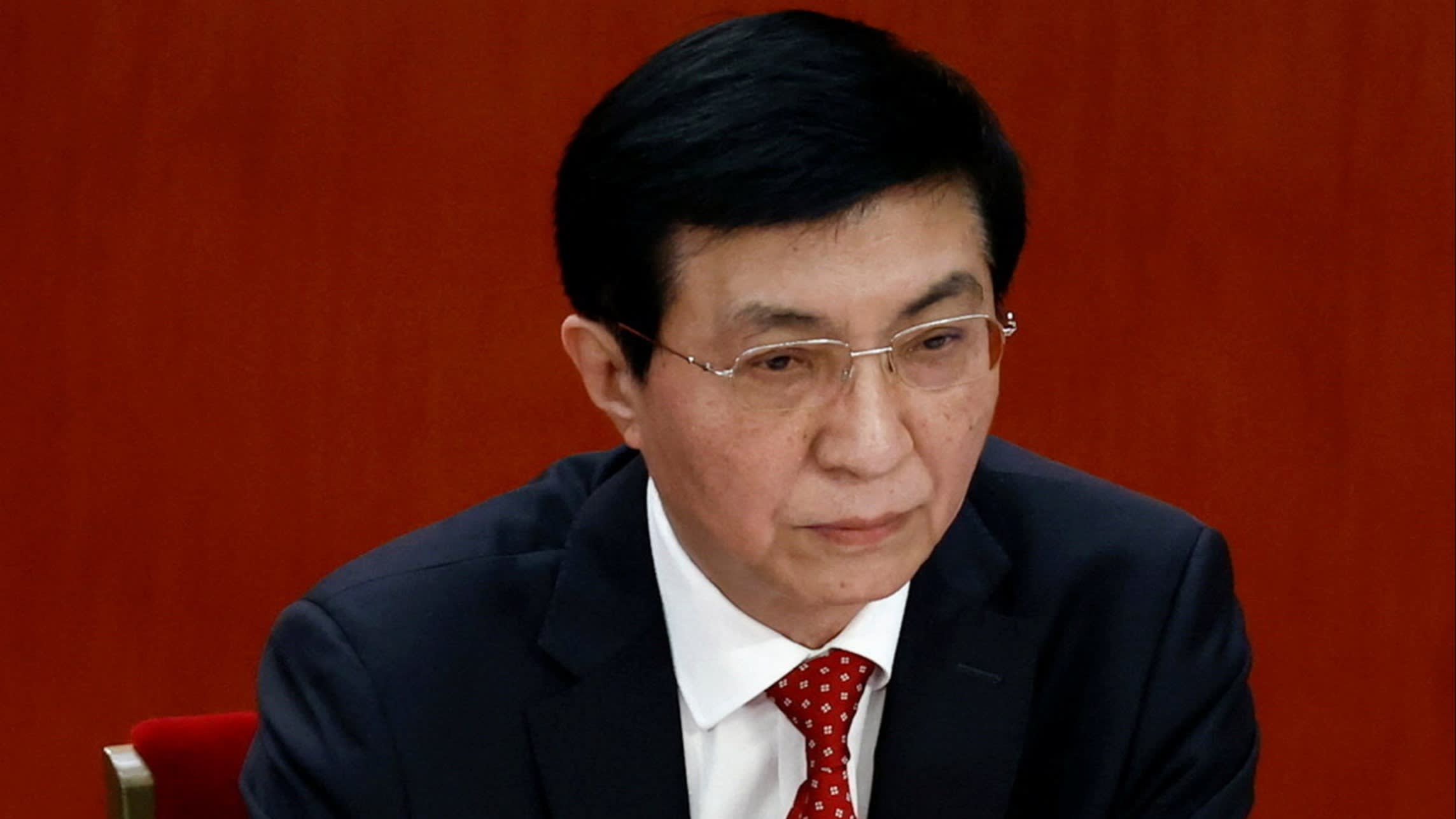
Hello Swampians, it’s Gideon Rachman here, the FT’s chief foreign affairs columnist, standing in for Ed.
Wang Huning has been variously described as “China’s crown theorist” and as Xi Jinping’s “ideological tsar”. But he is more than just an influential thinker. As one of just seven members of the Politburo Standing Committee of the Chinese Communist party, he is one of the most powerful people in China.
If any one person shapes President Xi Jinping’s thinking on America, it is probably Wang, who wrote an influential book on the US called America Against America, published in 1991, after a six-month stint as a visiting scholar in the US.
Given Wang’s eminence now, the book makes for interesting reading. Its argument is that America’s greatest weakness is that it is a deeply divided country. That looks prescient, under current circumstances. On a personal note, I also found it interesting because I spent a year at Princeton University at the same time as Wang was knocking around American colleges. So I remember many of the debates that he engages with — including the controversies about Allan Bloom’s The Closing of the American Mind and the rise of Japan.
So did Wang see it all coming? Reading America against America, it is striking how impressionistic many of its strongest conclusions are. Wang does cite academic theories and seminars. But he seems to have spent a lot of his time watching TV, reading the New York Times and getting lost. And it is these experiences that shape his views of a dysfunctional America that is facing “unstoppable undercurrents of crisis”.
In the concluding chapter which outlines these various currents, Wang kicks off by focusing on the disintegration of the American family and the costs this will impose on the government. Then he focuses on education. After watching a TV programme called Why are Kids Failing?, he concludes that in America “the standard of education is so poor that it is inconceivable to the average person”. Then it is on to the problem of “stray teenagers” with evidence gleaned from Kramer versus Kramer.
Undercurrent four is drugs. He notes: “Teenage drug use is exceptionally high. I saw a movie about how a high school principal goes about running a dirty school with a black high school student as his main opponent.”
Section five is on the Triads (or that’s how its rendered in the English translation). Wang observes sagely: “Those who have seen the film The Godfather have an understanding of the Mafia organisation.” He also recommends the movie Family Honor and a book called Mafia Enforcer: A True Story of Life and Death in the Mob.
Further sections follow, looking at the homeless, native Americans, America’s “spiritual crisis” (with extensive citations of Bloom) and whether the US is an “Empire of the Sun”. (Another movie that had just come out at the time.)
Wang observes, not terribly controversially, that “the black issue” is a big social problem in the US. He is unsettled by “black neighbourhoods”, writing that “In front of many households there are some lazy black people sitting. Young people stand in groups on the street, people’s hearts beat.” He also notes that “I heard a lot of stories about black people robbing Chinese people.”
While this sort of stuff comes across as crass — or worse — he also makes a prediction that has some resonance: “The days of the KKK are behind us, but we cannot say they are gone. If society fails to find fundamental ways to improve the situation of blacks, it is likely to end up with more violent anti-black actions.” Is that a prediction of the rise of Donald Trump?
The last section, “Empire of the Sun”, is particularly intriguing. Wang certainly drank in the anti-Japanese hysteria of the time, observing that “Japan’s economic invasion of the United States far exceeded the indiscriminate bombing of that one day in Pearl Harbor” — which seems like a slightly hysterical reaction to the popularity of Sony TVs and the Toyota Corolla.
Wang was not surprised by Japan’s success, observing that the “American system which is generally based on individualism, hedonism and democracy, is clearly losing out to a system of collectivism, self-forgetfulness and authoritarianism”. But he did not buy the idea of Japan as Number One, the title of another popular book of the time. As he correctly observed, Japan lacked the resources and territory to surpass the United States.
On the other hand, Japan he predicted would only be the first nation to challenge the US: “In the next century more nations are bound to challenge the United States as well. It is then that Americans will truly reflect on their politics, economy and culture.” He does not need to spell out which nations — or nation — he has in mind.
I’m pleased to be able call on my colleague Jonathan Derbyshire, the FT’s US opinion editor, to respond. So what do you think Jonathan? Was Wang Huning a prophet or just an unhappy visiting academic?
Recommended reading
My guess is that the most talked about piece in the FT this week was Jemima Kelly’s account of going to a party with alt-right influencers, including Curtis Yarvin. Her article is funny, perceptive and beautifully written — and has a touch of Hunter S Thompson about it, though featuring Taittinger rather than drugs.
Not that I’m obsessed or anything, but I also enjoyed another insight into the thinking of the far-right by the historian Andrew Roberts who explains why the far right hates Churchill. It’s in the Wall Street Journal, but don’t let that put you off (this time).
My column this week, written ahead of the Alaska summit, looked at possible ways of ending the Ukraine war.
And it may have inspired this rejoinder from the foreign ministers of the three Baltic states.
Jonathan Derbyshire replies
Thanks, Gideon. I’m grateful to you for drawing my attention to Wang’s book, which I hadn’t come across previously. I have, though, recently been re-reading Bloom’s Closing, so intimations of civilisational collapse have been very much on my mind!
I think Wang was a prophet of sorts — especially as he issued his prediction that “in the next century more nations are bound to challenge the United States” at precisely the moment the cold war was coming to an end (the Soviet Union collapsed in the year his book was published) and a “unipolar” era of untrammelled American global hegemony seemed to be at hand.
Of course, China had been experiencing double-digit GDP growth for more than a decade by the time Wang’s book came out. But the so-called China shock, which saw a surge of Chinese imports into the US economy and a corresponding haemorrhaging of American manufacturing jobs, and which according to some was one of the incubators of Trumpism, was still more than 10 years off.
So we can credit Wang either with impressive powers of prediction or else with the loyal party cadre’s iron faith in the ultimate triumph of “socialism with Chinese characteristics” — or maybe both.
Two other things caught my eye in the passages you discuss. First, the focus on Japan’s growing economic might, which, as you say, is partly just a reflection of the anti-Japanese “hysteria” that gripped American policymaking and business circles in the late 1980s. Of course, one of the most enthusiastic and vocal Japan-bashers in the US at the time was none other than Trump himself. His belief that “America is being ripped off” and that tariffs are the way to put an end to all that dates back to this period.
The second striking thing is the extent to which Wang’s analysis of America’s “spiritual” sickness anticipates one of the core tenets of his boss Xi Jinping’s worldview: that western, and in particular American, civilisation is decadent.
Ironically, many of Trump’s acolytes on the US right think the same. The difference is that while they think America can be saved, Xi, in impeccably Marxist fashion, believes it contains the seeds of its own terminal decline.
Your feedback
We’d love to hear from you. You can email the team on swampnotes@ft.com, contact Gideon on gideon.rachman@ft.com and Jonathan on jonathan.derbyshire@ft.com, and follow them on X at @jderbyshire and @gideonrachman. We may feature an excerpt of your response in the next newsletter


